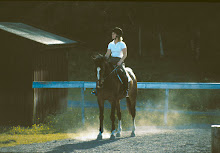
In the wild it was the “spooky” or watchful horses that survived, the ancestors to the horses we have today.
The others were eaten.
The others were eaten.
So even if it is irritating for us, it makes sense to the horse.
Spooking can be difficult to generalize, but I believe that there are two main categories.
First category is spooking as a result of how the horse is managed.
The risk of spooking increases with too much grain feed for the work to be done, too little exercise or turnout, or too little stimuli.
If the horse has had a day or two off, then I’m not surprised if I experience some surplus energy. If it’s a windy or cold day in addition, well. A horse is a horse.
I believe we are not dealing with an anxious horse in this case, this is more a way for the horse to let the excess steam off and saying “ Oh I feel GOOOD today”, flexing the muscles and feeling fine. And not listening enough.
So I would put this horse to some mind consuming up-tempo work. And look into my routines, if I feel that spooking is a problem with my horse.
My present horse Fame falls into this category.
She is a well-muscled “teenager” (6 yrs) with a high opinion of herself, looking for entertainment whenever the opportunity comes along.
Her favourite trick when we canter on trail is to pretend to get scared, instantly jump a meter or two to the side and grab the opportunity to take off. Haha.
The risk of spooking increases with too much grain feed for the work to be done, too little exercise or turnout, or too little stimuli.
If the horse has had a day or two off, then I’m not surprised if I experience some surplus energy. If it’s a windy or cold day in addition, well. A horse is a horse.
I believe we are not dealing with an anxious horse in this case, this is more a way for the horse to let the excess steam off and saying “ Oh I feel GOOOD today”, flexing the muscles and feeling fine. And not listening enough.
So I would put this horse to some mind consuming up-tempo work. And look into my routines, if I feel that spooking is a problem with my horse.
My present horse Fame falls into this category.
She is a well-muscled “teenager” (6 yrs) with a high opinion of herself, looking for entertainment whenever the opportunity comes along.
Her favourite trick when we canter on trail is to pretend to get scared, instantly jump a meter or two to the side and grab the opportunity to take off. Haha.
But the second category, those are the born spooky ones.
I believe that a born spooker dies a spooker. Maybe a bit improved through patience and training, but they are anxious and spooks to be on the safe side.
I believe that the rider has to be really patient and build confidence over time to minimize the problem. The safer the horse feels with his rider, the less spooking problem she’ll have. But there will definitely be some seat training along the road.
I have had two of these. One of them grew old with me, the other we sold as he didn’t function well in competitions.
My dear Amigo. The first month after I got him, he was snorting (and spooking) all the time when out on trail. We renamed him Piglet.
My tactics with the anxious horses is to ignore the problem.
Don’t fight, don’t “go looking” .
If it is one part of the arena that is scary, don't look up the problem. Get the horse to concentrate on the work away from the scary things, and expand the area that you are working in bit by bit. Usually they forget that it was scary after a while.
If it is a scary horse-leg-eater out on trail, don’t look at the stone yourself. If the horse freezes, let him stand a moment and look, and then ask him to go. Keep the reins long. Try not to tense up, and don’t get angry. Let him dance a couple of steps when passing, if necessary.
I believe that a born spooker dies a spooker. Maybe a bit improved through patience and training, but they are anxious and spooks to be on the safe side.
I believe that the rider has to be really patient and build confidence over time to minimize the problem. The safer the horse feels with his rider, the less spooking problem she’ll have. But there will definitely be some seat training along the road.
I have had two of these. One of them grew old with me, the other we sold as he didn’t function well in competitions.
My dear Amigo. The first month after I got him, he was snorting (and spooking) all the time when out on trail. We renamed him Piglet.
My tactics with the anxious horses is to ignore the problem.
Don’t fight, don’t “go looking” .
If it is one part of the arena that is scary, don't look up the problem. Get the horse to concentrate on the work away from the scary things, and expand the area that you are working in bit by bit. Usually they forget that it was scary after a while.
If it is a scary horse-leg-eater out on trail, don’t look at the stone yourself. If the horse freezes, let him stand a moment and look, and then ask him to go. Keep the reins long. Try not to tense up, and don’t get angry. Let him dance a couple of steps when passing, if necessary.
Out in the traffic it is more tricky.
Here you have to plan the strategy before your horse reacts.
If I have cars coming from behind when I am to pass something that might be “dangerous” I halt and let the cars pass first. Or I give a sign, ride out in the road so the cars have to stay behind us until we have passed the scary object.
If I have cars coming from behind when I am to pass something that might be “dangerous” I halt and let the cars pass first. Or I give a sign, ride out in the road so the cars have to stay behind us until we have passed the scary object.
Apart from the main categories there's all the other situations, normal horses spooking in situations that “need” spooking to, from the horse’s point of view.
A horse out alone spooks more as he has to be on watch. Horse logic.
A horse that goes first out on trail together with others also spooks more than the ones that follows. The first horse has to deal with the leg-eating monsters in the bushes, the others can safely pass. Horse logic.
My spooky horses have trained me well.
As long as I have remembered to tighten the girth I stay in the saddle.
It is a bit more difficult to stay on with your saddle hanging on the side, lol.
My spooky horses have trained me well.
As long as I have remembered to tighten the girth I stay in the saddle.
It is a bit more difficult to stay on with your saddle hanging on the side, lol.
Which has happened...




























3 comments:
Känner väl igen det du beskriver! Min Disco är INTE tittig av sig, men nu när det är isigt o svårt att rida får han för lite motion o då blir det "spöken" överallt bara för att han måste få utlopp för överskottsenergin. Inte alls konstigt. Därför flög jag av förra veckan... Inte beredd på det...
Men en annan häst jag hade såg jämt spöken. Varje dag. Speciellt om jag krävde lite av henne blev det värre. Det konstiga var att när vi var ute på tävling tittade hon ALDRIG. Konstigt.
Mycket intressant ämne!
oh have I been there. My recently retired TB was a BIG SPOOK!!
Daily. Never saw it coming. But regular work helped tune her into me, and less into the scary TB eating pole, post, garbage can, whatever.
I once had an enormous spook while I was trotting on the track-for a butterfly. No kidding.
alberta
Hi Irene and Alberta, and thanks for your comments.
Irene mentioned something that I had forgotten. How spooky horses can be when they are getting a bit tired, or put to straineous work sometimes :-)
Suddenly a corner contains a bunch of ghosts. Yes, it does. And they are coming to get me too. Can't work now, don't you see?
And a butterfly Alberta?? I think that is the best so far!
Post a Comment